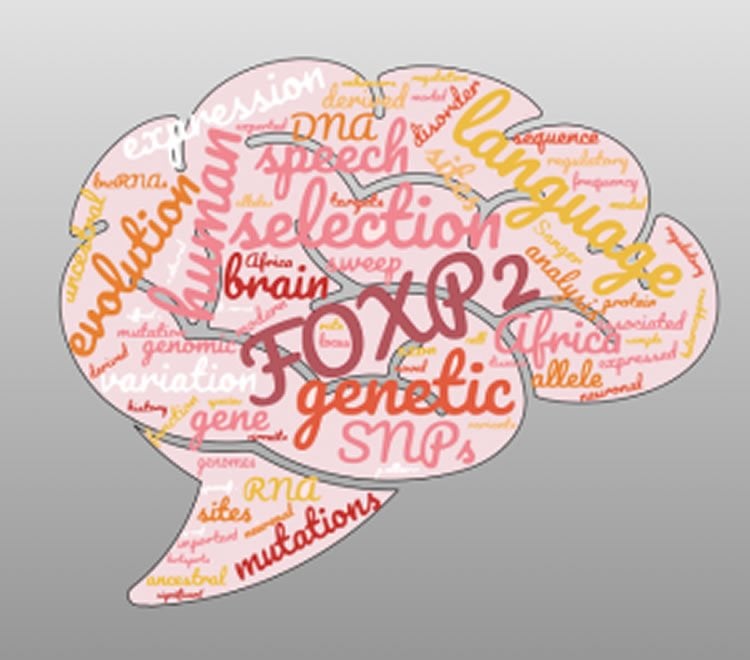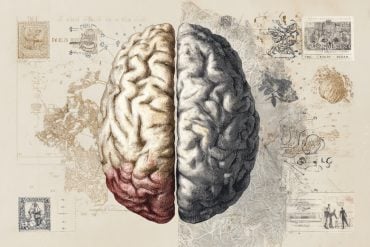Summary: A new study challenges how we think about how humans acquired language. The study found no evidence that recent, human specific selection occurs for the FOXP2 gene in relation to language development.
Source: UC Davis.
A gene implicated in affecting speech and language, FOXP2, is held up as a “textbook” example of positive selection on a human-specific trait. But in a paper in the journal Cell on Aug. 2, researchers challenge this finding. Their analysis of genetic data from a diverse sample of modern people and Neanderthals saw no evidence for recent, human-specific selection of FOXP2 and revises the history of how we think humans acquired language.
A paper published in 2002 claimed there was a selective sweep relatively recently in human evolutionary history that could largely account for our linguistic abilities and even help explain how modern humans were able to flourish so rapidly in Africa within the last 50-100,000 years, said senior author Brenna Henn, a population geneticist at Stony Brook University and UC Davis. Henn was immediately interested in the dating of these mutations and the selective sweep. She wanted to re-analyze FOXP2 with larger and more diverse data sets, especially in more African populations.
More genetic information available now
Henn says that when the original 2002 work was done, the researchers did not have access to the modern sequencing technology that now provides data on whole genomes, so they only analyzed a small fraction of the FOXP2 gene in about 20 individuals, mostly of Eurasian descent.
“We wanted to test whether their hypothesis stood up against a larger, more diverse data set that more explicitly controlled for human demography,” she said.
FOXP2 is highly expressed during brain development and regulates some muscle movements aiding in language production. When the gene isn’t expressed, it causes a condition called specific language impairment in which people may perform normally on cognitive tests but cannot produce spoken language. FOXP2 has also been shown to regulate language-like behaviors in mice and songbirds.
“In the past five years, several archaic hominin genomes have been sequenced, and FOXP2 was among the first genes examined because it was so important and supposedly human-specific,” said first author Elizabeth Atkinson of Stony Brook University and the Broad Institute of Harvard and MIT. “But this new data threw a wrench in the 2002 paper’s timeline, and it turns out that the FOXP2 mutations we thought to be human-specific, aren’t.”
Atkinson and her colleagues assembled mostly publicly available data from diverse human genomes – both modern and archaic – and analyzed the entire FOXP2 gene while comparing it to the surrounding genetic information to better understand the context for its evolution. Despite attempting a series of different statistical tests, they were unable to replicate this idea that there was any positive selection occurring for FOXP2.

The researchers hope that this paper will serve as a template for other population geneticists to conduct similar projects on human evolutionary history in the future.
“We’re interested in figuring out, on a genetic level, what makes us human,” Henn said. “This paper shows how important it is to use a diverse set of humans in studying the evolution of all of us as a species. There’s a severe Eurocentric bias in a lot of medical and other scientific studies, but we’ve found a scientific impetus for emphasizing diversity and inclusivity in data collection because it clearly yields more accurate results.”
Funding: The research was funded by the National Institutes of Health and a Terman Fellowship.
Source: Karen Nikos-Rose – UC Davis
Publisher: Organized by NeuroscienceNews.com.
Image Source: NeuroscienceNews.com image is credited to Brenna Henn, UC Davis.
Original Research: Abstract for “No Evidence for Recent Selection at FOXP2 among Diverse Human Populations” by Elizabeth Grace Atkinson, Amanda Jane Audesse, Julia Adela Palacios, Dean Michael Bobo, Ashley Elizabeth Webb, Sohini Ramachandran, and Brenna Mariah Henn in Cell. Published August 2 2018.
doi:10.1016/j.cell.2018.06.048
[cbtabs][cbtab title=”MLA”]UC Davis”Study Challenges Evolution of How Humans Acquired Language.” NeuroscienceNews. NeuroscienceNews, 5 August 2018.
<https://neurosciencenews.com/genetics-language-9658/>.[/cbtab][cbtab title=”APA”]UC Davis(2018, August 5). Study Challenges Evolution of How Humans Acquired Language. NeuroscienceNews. Retrieved August 5, 2018 from https://neurosciencenews.com/genetics-language-9658/[/cbtab][cbtab title=”Chicago”]UC Davis”Study Challenges Evolution of How Humans Acquired Language.” https://neurosciencenews.com/genetics-language-9658/ (accessed August 5, 2018).[/cbtab][/cbtabs]
Abstract
No Evidence for Recent Selection at FOXP2 among Diverse Human Populations
FOXP2, initially identified for its role in human speech, contains two nonsynonymous substitutions derived in the human lineage. Evidence for a recent selective sweep in Homo sapiens, however, is at odds with the presence of these substitutions in archaic hominins. Here, we comprehensively reanalyze FOXP2 in hundreds of globally distributed genomes to test for recent selection. We do not find evidence of recent positive or balancing selection at FOXP2. Instead, the original signal appears to have been due to sample composition. Our tests do identify an intronic region that is enriched for highly conserved sites that are polymorphic among humans, compatible with a loss of function in humans. This region is lowly expressed in relevant tissue types that were tested via RNA-seq in human prefrontal cortex and RT-PCR in immortalized human brain cells. Our results represent a substantial revision to the adaptive history of FOXP2, a gene regarded as vital to human evolution.







